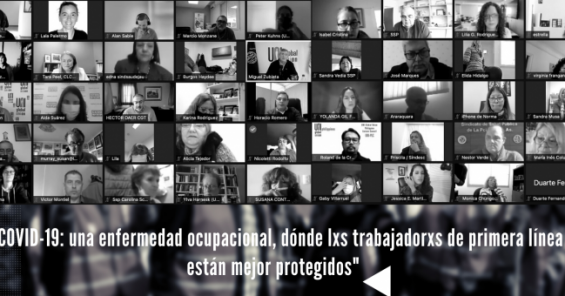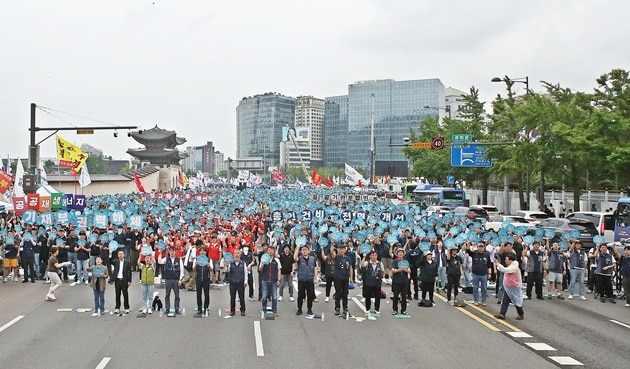More than 200 union leaders participated in the webinar “COVID-19: an occupational disease, where frontline workers are best protected”, organized by UNI Global Union and Argentinian healthcare union FATSA, which highlighted the fundamental role unions play in safeguarding workers during the pandemic.
This comes after a global study by UNI Global Union and ITUC found that recognizing Covid-19 as an occupational disease could make a huge difference for workers, and unions are pushing to make it happen.
Miguel Zubieta, Global President of UNI’s UNICARE sector, opened the seminar stating that “today is the time to identify our strengths and weaknesses and analyze how to build true social dialogue, especially in the face of a tragedy that has devastated all of humanity.”
Since the start of the health crisis many governments have failed to protect workers, and it was the unions that made the difference, as in the case of Peru, where Covid-19 was recognized as an occupational disease thanks to joint union action by la Coordinadora de Salud.
“Recognizing Covid-19 as an occupational disease would be incredibly important in many countries. It could ensure that the brave essential workers who put their lives on the line throughout the pandemic can receive medical care, are protected from dismissal, and entitled to compensation,” said Christy Hoffman, General Secretary of UNI Global Union.
In this regard, Owen Tudor, Deputy General Secretary of the ITUC, added: “This would make governments more accountable and lead to greater compliance with the core ILO conventions on health and safety at work.”
The testimonies of the participants showed that at the regional level, UNI Global Union and its affiliated unions in the care sector carried out not only tasks related to the fight against COVID-19, but also strengthened their bargaining power, organized more workers, built more and better unity, achieved better wages, and continued their strategies to fight against precarious work.
“Health professionals have been treating thousands of victims of COVID-19 for more than a year, but the Covid-denying government, which encourages people not to wear masks, has worsened the situation,” said Edna Alves, President of the Sindicato dos Trabalhadores da Saúde de Jaú (Health Workers Union of Jaú) in Brazil. They also stressed that workers should not have to risk their lives for the sake of a paycheck, but that is exactly what has happened to millions of frontline workers in the past year and a half.
“We have seen the lack of preventive measures and much remains to be done, but the union struggle has been very important. Comisiones Obreras has constantly denounced the lack of protective equipment and breach of protocols,” said Yolanda Gil, nurse and International and Youth Secretary and Sector Strategies of FSS-CCOO, Spain.
In countries like Canada, the pandemic also shed light on health and safety failings. “We have experienced flaws in prevention activities, and despite having the tools, they were not considered useful for this virus. There is a lot of work to be done so that workers and citizens do not have to carry the burden of this,” said Tara Peel from the Canadian Labour Congress.
Argentine Minister, Claudio Moroni, participated in the event and highlighted the commitment of Argentine workers and unions since the beginning of the pandemic:
“We maintained the institutions of social dialogue, such as collective bargaining to guarantee wages, committees of health and safety at work, and made sure that work contracts were respected, prohibiting layoffs.”
Héctor Daer, President of UNI Americas and Deputy General Secretary of FATSA, added that organizing and collective bargaining were the necessary tools to improve the lives of brothers and sisters in the sector.
“Although in our personal, union and political lives there is a before and after COVID-19, in unionism there is no before and after. The pandemic did not stop us. Where we had strong and well-organized unions, we were able to react effectively in the face of an unprecedented challenge. In some cases, through positive dialogue with governments and businesses, in other cases, with struggle and mobilization, but always with the presence of union organizations,” he declared.
Vaccines are slowly helping us take control of the pandemic, but the danger for essential workers is far from over. For Jessica E. Martinez, Co-Executive Director of the National Council for Occupational Safety and Health National (COSH) United States, the pandemic has exacerbated historical injustices, including economic and racial inequality. “Workers have been silenced and have been working in dangerous conditions for too long. We have seen inadequate protection measures and the lack of preparedness of the health care system. That must change now,” she emphasized.
The work of UNI Americas and the sector at a global level continues, because the problems are the same all over the world: “We have never let our guard down. The unions were very forceful in responding to #Covid-19. Our region is still having to face difficult situations, but we will continue with our commitment and show good examples everywhere,” said Marcio Monzane, UNI Americas Regional Secretary.
To conclude, Adrian Durstchi, Head of UNICARE, added: “The work of the unions to ensure that Covid-19 is recognized as an occupational disease was a feat of strength. UNICARE will continue to work to achieve guarantees for all workers, regardless of where they are”.


